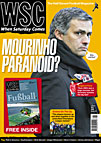 Derby won the title with a low 53 points, as the title fight was between a mish-mash of "town" teams. Roger Titford reports
Derby won the title with a low 53 points, as the title fight was between a mish-mash of "town" teams. Roger Titford reports
The long-term significance
If there was a remake of this season it would be called “What Happens When Big Clubs Go Bad”. For the last time, possibly ever, a variety of “town” teams – Ipswich, Burnley, Derby and Stoke among them – contested the League title deep into the spring. It was an unusual year in many respects: miners did relatively better than stockbrokers in the economic crisis, glamrock was dying and punk not yet born, and England’s big three suffered like never since. It was Liverpool’s only trophyless season between 1973 and 1984. Arsenal spent some time bottom of the table, which they haven’t done since. Manchester United weren’t even in the top flight. Revie, Shankly, Nicholson, Greenwood and Sexton had all followed Sir Alf Ramsey out of long-occupied managerial seats in 1974 and a chance emerged for the lesser lights to shine. It sounds now like an impossible feast of equal opportunity, but at the time they said it was dismal, mundane, violent and “the death of football”.
Story of the season
A Chris Balderstone penalty put Carlisle top after three games and that set the tone. Bobby Robson’s Ipswich took over as leaders but by mid-November only two points separated the top ten. Liverpool and Manchester City were in the hunt, too, yet by February Everton, Stoke and Burnley were joint top. Everton looked to have a winning lead in March but were upset by Carlisle, who did the double on them. Derby, tenth on Boxing Day, had a late run on a dreadful home pitch that took them top for the first time with two weeks to go. On the penultimate Saturday Ipswich, Everton and Liverpool all surprisingly lost and the Rams celebrated a second title in four years – with a goalless home draw against Carlisle. Colin Todd, Bruce Rioch and Francis Lee were among their stars. At the bottom, promoted Carlisle and Luton went straight back down, relegated along with Chelsea, who lost a vital end-of-season game at Spurs, preceded by massive on-pitch fighting. Spurs had been bottom earlier on and, like Leicester, earned a short reprieve from Division Two.
For the record books
Derby’s 53 points was only one above the all-time low title-winning total. The four League Cup semi-finalists (Aston Villa, Norwich, Chester and Man Utd), one FA Cup finalist (Fulham), the Footballer of the Year (Fulham’s Alan Mullery) and the Manager of the Year (Ron Saunders of Villa) all came from outside Division One. Wimbledon were the first non-League side to win at a First Division ground (Burnley) in modern times while Everton, Leeds and Middlesbrough were taken to replays by non-Leaguers. Not a vintage year.
Same place today
Only ten of the 22 sides from 1974-75 are today in the top division, with Liverpool, Newcastle and Manchester City occupying roughly similar positions.
Moved furthest away
Carlisle fell out the League in 2004 for a season while Luton, Sheffield United, Burnley and Wolves have all played in the bottom division. But perhaps the most alien concept to the modern reader is the idea of a high-spending Stoke in Europe, with two current England internationals and crowds of up to 45,000. They were in with a title chance in April – despite losing four players with broken legs during the season. Relegation-haunted Arsenal’s all-British side often lined up in front of sub-20,000 crowds, while the backroom staff were instructed to turn off lights in the corridors to save money.
Went on to greater things
Liverpool ~ signed Ray Kennedy, Terry McDermott and the soon-to-be improbably be-medalled Phil Neal.
Freedom of contract ~ The UK’s membership of the European Economic Community was confirmed by a referendum just after the end of the season, prompting the PFA to launch a campaign for freedom of contract, eventually resolved 20 years later by the Bosman case.
Identity cards ~ as a way of controlling the desperate hooligan problem were first mooted by the Minister for Sport, Labour’s Denis Howell. Surrogate ID (membership) cards now exist at many top clubs.
Disappearing from view
Terry Mancini ~ of London’s top side, Queens Park Rangers, dropped his shorts in front of the directors and was promptly sold off… to Arsenal.
English sides in Europe ~ All but Leeds were gone by Christmas.
Alan Hudson ~ of Stoke and Manchester City’s Colin Bell were coming to the end of their great days, though both played for England when they beat world champions West Germany in a friendly.
Alan Ball ~ The last of the 1966 World Cup winners still playing for England won his final cap in the 5-1 defeat of Scotland at Wembley.
From WSC 231 May 2006. What was happening this month